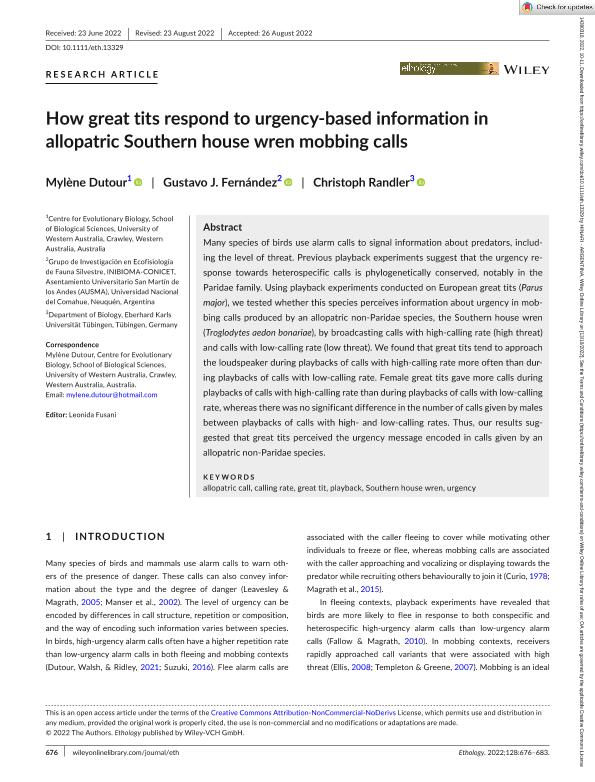Mostrar el registro sencillo del ítem
dc.contributor.author
Dutour, Mylène
dc.contributor.author
Fernandez, Gustavo Javier

dc.contributor.author
Randler, Christoph
dc.date.available
2023-07-20T12:04:54Z
dc.date.issued
2022-11
dc.identifier.citation
Dutour, Mylène; Fernandez, Gustavo Javier; Randler, Christoph; How great tits respond to urgency-based information in allopatric Southern house wren mobbing calls; Wiley Blackwell Publishing, Inc; Ethology; 128; 10-11; 11-2022; 676-683
dc.identifier.issn
0179-1613
dc.identifier.uri
http://hdl.handle.net/11336/204559
dc.description.abstract
Many species of birds use alarm calls to signal information about predators, including the level of threat. Previous playback experiments suggest that the urgency response towards heterospecific calls is phylogenetically conserved, notably in the Paridae family. Using playback experiments conducted on European great tits (Parus major), we tested whether this species perceives information about urgency in mobbing calls produced by an allopatric non-Paridae species, the Southern house wren (Troglodytes aedon bonariae), by broadcasting calls with high-calling rate (high threat) and calls with low-calling rate (low threat). We found that great tits tend to approach the loudspeaker during playbacks of calls with high-calling rate more often than during playbacks of calls with low-calling rate. Female great tits gave more calls during playbacks of calls with high-calling rate than during playbacks of calls with low-calling rate, whereas there was no significant difference in the number of calls given by males between playbacks of calls with high- and low-calling rates. Thus, our results suggested that great tits perceived the urgency message encoded in calls given by an allopatric non-Paridae species.
dc.format
application/pdf
dc.language.iso
eng
dc.publisher
Wiley Blackwell Publishing, Inc

dc.rights
info:eu-repo/semantics/openAccess
dc.rights.uri
https://creativecommons.org/licenses/by-nc-nd/2.5/ar/
dc.subject
ALLOPATRIC CALL
dc.subject
CALLING RATE
dc.subject
GREAT TIT
dc.subject
PLAYBACK
dc.subject
SOUTHERN HOUSE WREN
dc.subject
URGENCY
dc.subject.classification
Zoología, Ornitología, Entomología, Etología

dc.subject.classification
Ciencias Biológicas

dc.subject.classification
CIENCIAS NATURALES Y EXACTAS

dc.title
How great tits respond to urgency-based information in allopatric Southern house wren mobbing calls
dc.type
info:eu-repo/semantics/article
dc.type
info:ar-repo/semantics/artículo
dc.type
info:eu-repo/semantics/publishedVersion
dc.date.updated
2023-06-29T10:25:19Z
dc.identifier.eissn
1439-0310
dc.journal.volume
128
dc.journal.number
10-11
dc.journal.pagination
676-683
dc.journal.pais
Reino Unido

dc.journal.ciudad
Londres
dc.description.fil
Fil: Dutour, Mylène. University of Western Australia; Australia
dc.description.fil
Fil: Fernandez, Gustavo Javier. Consejo Nacional de Investigaciones Científicas y Técnicas. Centro Científico Tecnológico Conicet - Patagonia Norte. Instituto de Investigaciones en Biodiversidad y Medioambiente. Universidad Nacional del Comahue. Centro Regional Universidad Bariloche. Instituto de Investigaciones en Biodiversidad y Medioambiente; Argentina
dc.description.fil
Fil: Randler, Christoph. Eberhard Karls Universität Tübingen; Alemania
dc.journal.title
Ethology

dc.relation.alternativeid
info:eu-repo/semantics/altIdentifier/url/https://onlinelibrary.wiley.com/doi/10.1111/eth.13329
dc.relation.alternativeid
info:eu-repo/semantics/altIdentifier/doi/http://dx.doi.org/10.1111/eth.13329
Archivos asociados
